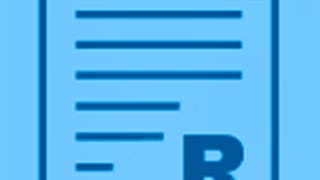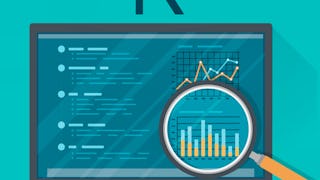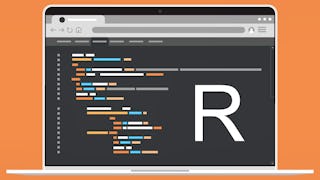This course is the seventh course in the Google Data Analytics Certificate. In this course, you’ll learn about the programming language known as R. You’ll find out how to use RStudio, the environment that allows you to work with R, and the software applications and tools that are unique to R, such as R packages. You’ll discover how R lets you clean, organize, analyze, visualize, and report data in new and more powerful ways. Current Google data analysts will continue to instruct and provide you with hands-on ways to accomplish common data analyst tasks with the best tools and resources.

Enjoy unlimited growth with a year of Coursera Plus for $199 (regularly $399). Save now.

Data Analysis with R Programming
This course is part of Google Data Analytics Professional Certificate

Instructor: Google Career Certificates
767,554 already enrolled
Included with
(11,777 reviews)
Recommended experience
What you'll learn
Describe the R programming language and its programming environment.
Explain the fundamental concepts associated with programming in R including functions, variables, data types, pipes, and vectors.
Describe the options for generating visualizations in R.
Demonstrate an understanding of the basic formatting in R Markdown to create structure and emphasize content.
Skills you'll gain
Details to know

Add to your LinkedIn profile
36 quizzes, 2 assignments
See how employees at top companies are mastering in-demand skills

Build your Data Analysis expertise
- Learn new concepts from industry experts
- Gain a foundational understanding of a subject or tool
- Develop job-relevant skills with hands-on projects
- Earn a shareable career certificate from Google

There are 5 modules in this course
R is a programming language that can help you in your data analysis process. In this part of the course, you’ll learn about R and RStudio, the environment you’ll use to work in R. You’ll explore the benefits of using R and RStudio as well as the components of RStudio that will help you get started.
What's included
6 videos9 readings6 quizzes1 assignment
Using R can help you complete your analysis efficiently and effectively. In this part of the course, you’ll explore the fundamental concepts associated with R. You’ll learn about functions and variables for calculations and other programming. In addition, you'll discover R packages, which are collections of R functions, code and sample data that you’ll use in RStudio.
What's included
8 videos8 readings7 quizzes1 plugin
The R programming language was designed to work with data at all stages of the data analysis process. In this part of the course, you’ll examine how R can help you structure, organize, and clean your data using functions and other processes. You’ll learn about data frames and how to work with them in R. You’ll also revisit the issue of data bias and how R can help.
What's included
8 videos8 readings7 quizzes1 assignment1 plugin
R is a tool well-suited for creating detailed visualizations. In this part of the course, you’ll learn how to use R to generate and troubleshoot visualizations. You’ll also explore the features of R and RStudio that will help you with the aesthetics of your visualizations and for annotating and saving them.
What's included
9 videos7 readings9 quizzes1 plugin
When you’re ready to save and present your analysis, R has different options to consider. In this part of the course, you’ll explore R Markdown, a file format for making dynamic documents with R. You’ll find out how to format and export R Markdown, including how to incorporate R code chunks in your documents.
What's included
8 videos6 readings7 quizzes
Earn a career certificate
Add this credential to your LinkedIn profile, resume, or CV. Share it on social media and in your performance review.
Instructor

Offered by
Explore more from Data Analysis
 Status: Free Trial
Status: Free Trial Status: Free Trial
Status: Free Trial Status: Free Trial
Status: Free Trial
Why people choose Coursera for their career




Learner reviews
11,777 reviews
- 5 stars
82.47%
- 4 stars
13.31%
- 3 stars
2.53%
- 2 stars
0.73%
- 1 star
0.95%
Showing 3 of 11777
Reviewed on Jul 29, 2023
I had much better experience learning through this course. The reading and hands on material would bore and exhaust me because sometimes it was just too much. Other than that it's a great course.
Reviewed on Jun 23, 2023
Very well structured course and lots of examples for practice. The presenter also is very personable and has a nice way of expressing the content. I especially emjoyed the segment on visualization.
Reviewed on Mar 24, 2023
Great pacing to the course. A wealth of external resources shared which was valuable. Low audio to one of the videos in module 5. Course did not cover many statistics techniques with R programming.
Frequently asked questions
Data is a group of facts that can take many different forms, such as numbers, pictures, words, videos, observations, and more. We use and create data everyday, like when we stream a show or song or post on social media.
Data analytics is the collection, transformation, and organization of these facts to draw conclusions, make predictions, and drive informed decision-making.
The amount of data created each day is tremendous. Any time you use your phone, look up something online, stream music, shop with a credit card, post on social media, or use GPS to map a route, you’re creating data. Companies must continually adjust their products, services, tools, and business strategies to meet consumer demand and react to emerging trends. Because of this, data analyst roles are in demand and competitively paid.
Data analysts make sense of data and numbers to help organizations make better business decisions. They prepare, process, analyze, and visualize data, discovering patterns and trends and answering key questions along the way. Their work empowers their wider team to make better business decisions.
You will learn the skill set required for becoming a junior or associate data analyst in the Google Data Analytics Certificate. Data analysts know how to ask the right question; prepare, process, and analyze data for key insights; effectively share their findings with stakeholders; and provide data-driven recommendations for thoughtful action.
You’ll learn these job-ready skills in our certificate program through interactive content (discussion prompts, quizzes, and activities) in under six months, with under 10 hours of flexible study a week. Along the way, you'll work through a curriculum designed with input from top employers and industry leaders, like Tableau, Accenture, and Deloitte. You’ll even have the opportunity to complete a case study that you can share with potential employers to showcase your new skill set.
After you’ve graduated from the program, you’ll have access to career resources and be connected directly with employers hiring for open entry-level roles in data analytics.
More questions
Financial aid available,






